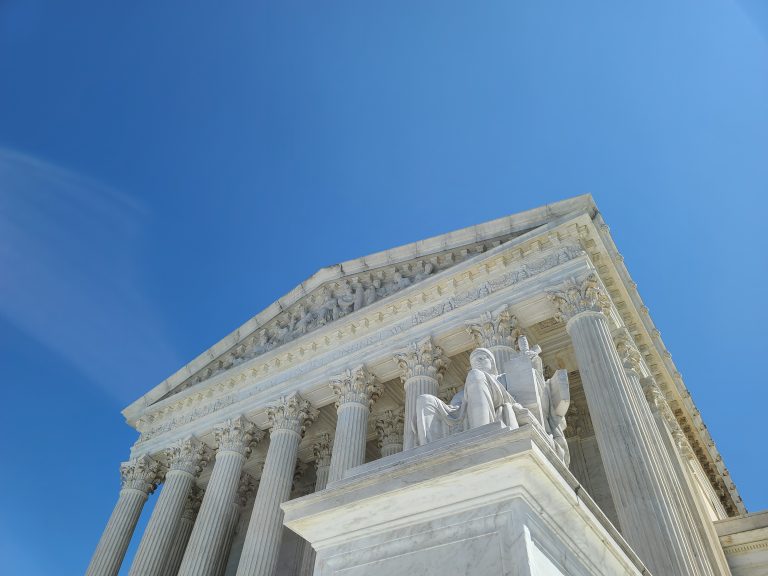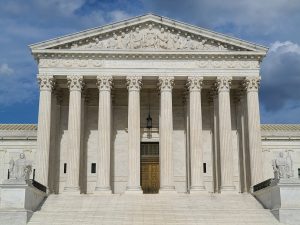Fresh off its victory in Rahimi, the Department of Justice (DOJ) is asking the Supreme Court to clarify who it can disarm under the Second Amendment.
US Solicitor General Elizabeth Prelogar filed a supplemental brief with the High Court on Monday to request that the Justices make the federal felony gun ban their next Second Amendment priority. Specifically, the brief asked for review in five separate appellate court cases dealing with the federal gun ban for felonies of varying severity. She argued such a move was necessary because the Court failed to address the issue in its latest Second Amendment decision.
“Now that the Court has decided Rahimi, we believe that it should grant plenary review to resolve Section 922(g)(1) ‘s constitutionality,” the brief reads. “Although this Court’s decision in Rahimi corrects some of the methodological errors made by courts that have held Section 922(g)(1) invalid, it is unlikely to fully resolve the existing conflict.”
The DOJ’s brief is the earliest indication of the legal fallout from the Court’s decision in US v. Rahimi, which upheld the domestic violence restraining order gun ban. It suggests that the federal government is unsatisfied with the Court’s narrow ruling in that case. It is seeking further guidance from the Court that will help lower courts evaluate the extent to which certain felons retain gun rights, something federal circuit courts have been divided over since Bruen.
Instead of providing a sweeping re-evaluation of Bruen, the majority stuck closely to the specific contours of the case against defendant Zachary Rahimi.
“When a restraining order contains a finding that an individual poses a credible threat to the physical safety of an intimate partner, that individual may—consistent with the Second Amendment—be banned from possessing firearms while the order is in effect,” Chief Justice John Roberts wrote in US v. Rahimi. “Since the founding, our Nation’s firearm laws have included provisions preventing individuals who threaten physical harm to others from misusing firearms. As applied to the facts of this case, Section 922(g)(8) fits comfortably within this tradition.”
DOJ’s request comes as the High Court considers which of its pending Second Amendment case petitions to grant. The brief’s request for expeditious review could sway the Justices to defer to the federal government’s wishes, as it has often done in past cases.
The DOJ already asked the Court to weigh in on the question of felon gun rights last October in the case Garland v. Range, which dealt with whether the government can permanently disarm somebody with a decades-old conviction for lying on an application for food stamps. The Third Circuit struck down the felony gun ban as applied to Bryan Range, and the Supreme Court has held DOJ’s request for appeal ever since.
“We agree with Range that, despite his false statement conviction, he remains among ‘the people’ protected by the Second Amendment,” Judge Thomas Hardiman, a George W. Bush appointee, wrote for an 11-4 Third Circuit majority that included two Biden, an Obama, and a Clinton appointee in Range v. AG. “And because the Government did not carry its burden of showing that our Nation’s history and tradition of firearm regulation support disarming Range, we will reverse and remand.”
In addition to Range, the Solicitor General’s brief requested review in Doss v. US, Cunningham v. US, Jackson v. US, and Vincent v. Garland. Unlike Range, those cases all stem from lower court decisions upholding the federal ban and feature an array of different predicate felony offenses.
Though she argued that the federal felony gun ban is constitutional across the board, Prelogar requested that the Justices agree to take at least three of the cited cases, selected by nature of the underlying felony offense. She grouped the cases into three separate categories based on violent felons, non-violent drug felons, and non-violent, non-drug felons and urged the Court to select one of each.
“Doing so would enable the Court to consider Section 922(g)(1) ‘s constitutionality across a range of circumstances that are fully representative of the statute’s applications,” she said.
She cautioned the Court against simply granting, vacating, and remanding (GVR) its pending felon-in-possession ban cases by appealing to the statute’s importance in criminal law. She noted that felon-in-possession convictions account for nearly 12 percent of all federal criminal cases and argued that continued uncertainty over the law poses a risk to public safety.
“The substantial costs of prolonging uncertainty about the statute’s constitutionality outweigh any benefits of further percolation,” she said. “Under these circumstances, the better course would be to grant plenary review now.”
The Supreme Court could issue a decision on the requested cases in the coming days. It will likely hold its end-of-term conference either later this week or early next week.






